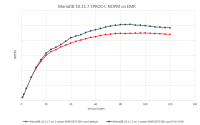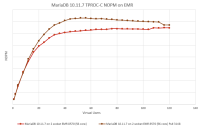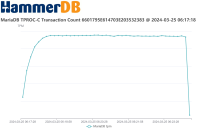Details
-
Bug
-
Status: Closed (View Workflow)
-
Critical
-
Resolution: Fixed
-
10.8(EOL), 10.9(EOL), 10.10(EOL), 10.11, 11.0(EOL), 11.1(EOL), 11.2(EOL), 11.3(EOL), 11.4
-
GNU/Linux, NUMA on Intel Xeon
Description
steve.shaw@intel.com is reporting that write intensive workloads on a NUMA system end up spending a lot of time in native_queued_spin_lock_slowpath.part.0 in the Linux kernel. He has provided a patch that adds a user-space spinlock around the calls to mtr_t::do_write() and is significantly improving throughput at larger numbers of concurrent connections in his test environment.
As far as I can tell, that patch would only allow one mtr_t::do_write() call to proceed at a time, and thus make waits on log_sys.latch extremely unlikely. But that would also seem to ruin part of what MDEV-27774 achieved.
If I understood it correctly, the idea would be better implemented at a slightly lower level, to allow maximum concurrency:
diff --git a/storage/innobase/mtr/mtr0mtr.cc b/storage/innobase/mtr/mtr0mtr.cc
|
index b819022fec6..884bb5af5c1 100644
|
--- a/storage/innobase/mtr/mtr0mtr.cc
|
+++ b/storage/innobase/mtr/mtr0mtr.cc
|
@@ -1052,7 +1052,7 @@ std::pair<lsn_t,mtr_t::page_flush_ahead> mtr_t::do_write()
|
}
|
|
if (!m_latch_ex)
|
- log_sys.latch.rd_lock(SRW_LOCK_CALL);
|
+ log_sys.latch.rd_spin_lock();
|
|
if (UNIV_UNLIKELY(m_user_space && !m_user_space->max_lsn &&
|
!is_predefined_tablespace(m_user_space->id))) |
The to-be-written member function rd_lock_spin() would avoid invoking futex_wait(), and instead keep invoking MY_RELAX_CPU() in the spin loop.
An exclusive log_sys.latch will be acquired rarely and held for rather short time, during DDL operations, undo tablespace truncation, as well as around log checkpoints.
Some experimentation will be needed to find something that scales well across the board (from embedded systems to high-end servers).
Attachments
Issue Links
- causes
-
MDEV-34422 InnoDB writes corrupted log on macOS and AIX due to uninitialized log_sys.lsn_lock
-
- Closed
-
- relates to
-
MDEV-27866 Switching log_sys.latch to use spin based variant
-
- Closed
-
-
MDEV-32374 log_sys.lsn_lock is a performance hog
-
- Closed
-
-
MDEV-21923 LSN allocation is a bottleneck
-
- In Review
-
- blocks
-
 PERF-407 Failed to load
PERF-407 Failed to load



I created two patches. On my Haswell microarchitecture dual Intel Xeon E5-2630 v4, both result in significantly worse throughput with 256-thread Sysbench oltp_update_index (actually I intended to test oltp_update_non_index) than the 10.11 baseline. With the baseline, the Linux kernel function native_queued_spin_lock_slowpath is the busiest one; with either fix, it would end up in the second place, behind the new function lsn_delay().
The first variant more closely resembles what steve.shaw@intel.com did. It uses std::atomic<bool> for the lock word; the lock acquisition would be xchg.
The second variant merges log_sys.lsn_lock to the most significant bit of log_sys.buf_free. Lock acquisition will be a loop around lock cmpxchg. It yields better throughput on my system than the first variant. One further thing that could be tried would be a combination of lock bts and a separate mov to load the log_sys.buf_free value. On ARMv8, POWER, RISC-V or other modern ISA, we could probably use simple std::atomic::fetch_or().
I think that some further testing on newer Intel microarchitectures is needed to determine whether I am on the right track with these.